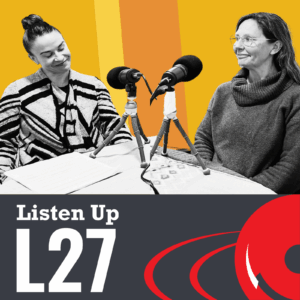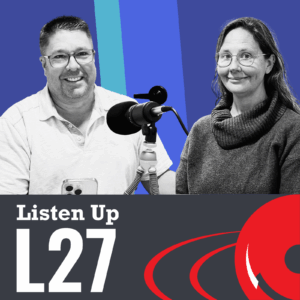In this episode of Listen Up L27, host Jen Pennington reconnects with Jamie Epting, mental health therapist at Station 2 Clinic, to explore how fire fighters can shake the “firehouse mindset” and create daily rituals that ease stress and prevent burnout. Jamie shares why the job’s stress doesn’t always stop when the shift ends and offers practical tools to help transition from high-alert to home life—including commute rituals, deep breathing, journaling, gratitude practices, and even cold water immersion.
She offers science-backed strategies to rewire the nervous system, explains how to form sustainable habits through consistency and reward, and stresses the importance of self-compassion—even on days when nothing seems to work. Whether you’ve hit a wall or just need a tune-up, this episode is packed with tools for building resilience and protecting your mental health.
🧠 Takeaways:
- Burnout often creeps in slowly—watch for irritability, apathy, and detachment.
- Commute rituals help signal to the brain it’s time to unwind.
- Breathwork and cold water dips can reset the nervous system.
- Journaling and gratitude build emotional processing and positivity.
- Habit stacking and self-competition can help build consistency.
- Self-compassion is key: it’s not about perfection, it’s about practice.
🔗 Find webinar info and more mental health resources at ff.clinic or SFFHealthcareTrust.org.
Transcript
Jamie Epting: So there’s this concept of habit stacking. So the more that we do something, the more likely we’ll do something.
So to create a new habit, we have to do it consistently at the same time every day or every day that we’re able to do that.
Jen Pennington: Hey Seattle Fire Fighters, this is Jen Pennington, your host @ listen up L27. We’re back again today with Jamie Epting, Station 2 Clinic’s new mental health therapist.
Today’s episode is burnout rituals for ditching the firehouse mindset. Jamie’s going to walk us through some daily practices to manage stress, process heavy calls, and help you leave the weight of the job at the station. Jamie, welcome back.
Jamie Epting: Thank you.
Jen Pennington: Well, let’s jump right in. What do you mean by firehouse mindset, and why is it so hard to shake even after a shift?
Jamie Epting: Yeah. So firehouse mindset essentially means a constant alertness, strong camaraderie, and a shared purpose in high stress environments, which is created within the firehouse.
So fire fighters experience repeated surges of stress hormones, so cortisol and adrenaline, and this leads to chronic hypervigilance. So this condition can create what’s called a cortisol addiction, meaning that your body adjusts to the high levels of stress as feeling normal.
So when things aren’t stressful and more chill, that can feel really uncomfortable for fire fighters. So the everyday stimuli of, like, loud noises and traffic that can trigger a fight, flight, freeze response, even off duty, the close bonds of the close bonds with crew members reinforces the state because there’s an expectation and a readiness that happens. And then without intentional unwinding of the fire, without intentional unwinding of the firehouse mindset set, your mind can stay permanently in what is an on duty, even at home.
Jen Pennington: And when we talk about burnout, it doesn’t always hit like a brick wall, so it can creep in kind of slowly. So what are some of the signs that someone might be carrying too much of the job home?
Jamie Epting: Yeah, some of the more common ones are irritability, cynicism, a sense of detachment to your job, apathy, sometimes even maybe like low grade sadness and low motivation.
Other ones might be procrastinating or avoiding work altogether, difficulty making decisions, things that you’ve already been able to make decisions about over and over again that might become more difficult and maybe growing, even like growing conflict between colleagues and supervisors.
Jen Pennington: So when we talk about rituals and we talk about mental transitions, what are a few of the simple daily practices you recommend to help fire fighters mentally close the door on work before walking into.
Jamie Epting: Home life, definitely the commute home ritual. So that time between getting off of your shift and going back to your home, even if that’s, you know, a short drive across Seattle or even longer, several hour drive, making that a very intentional time to decompress. So that could be listening to calming music, taking deep breaths, drinking water, anything that’s gonna be ritualistic, meaning you do it over and over again. Because that process of consistency will help your body actually internalize it and relax. So maybe you try it once and it doesn’t work, but the act of doing it over and over again will signal to your body that it’s okay to relax and calm down.
Jen Pennington: So when you’re going through all of this, the nervous system plays a big role in stress. Right. So can you give us a go to technique for calming after a tough.
Jamie Epting: Shift or call the immediate calming technique I think of for this is breathing.
So in our bodies we have a few mechanisms that are just naturally going to regulate our nervous system.
Deep breathing, what we call belly breath. You may have heard where you’re breathing deeply into your belly. So your belly rises up and you do that over and over again until you start to feel your heart rate go down or even your body’s tension released. So you don’t want to hyper hyperventilate. You want to take big deep breaths in. You can even hold it at the top for a few seconds and then you breathe out.
And what that does is it signals to our parasympathetic nervous system part, which is the calming down state, that it’s okay to relax. And it’s a natural thing that all of us, no matter who we are, have inside of our bodies.
Jen Pennington: Yeah. It’s one of the things they teach you too, about anxiety?
Jamie Epting: Yes.
Jen Pennington: You know, a panic attack or something like that to get your breath kind of under control.
Jamie Epting: Yes. Yep. And there’s one other one just throwing it out there. It’s called the dorsal dive response.
Jen Pennington: I’ve heard of this.
Jamie Epting: Yeah. So you don’t need to jump into a freezing cold lake. Although if you want to, and that works for you, that’s awesome. But there’s a mechanism in our body. It is a part of our survival mechanism that when we experience really cold water, our heart rate will slow down and our breathing will naturally slow down. So let’s say breathing’s not working for you. You can get a big bowl of water and put some ice in there and you can dip your face in, you know, for as long as you can handle it. And then you pull it out and you want to do that for about 30 seconds and that should work well for you. It can also have a lot of other benefits like make your skin look nice.
Jen Pennington: So a facial and a mental health tip.
Jamie Epting: Yes, yes.
Jen Pennington: So when someone’s at the end of their day and they’re trying to process something that may have happened, what is it that they can do? What’s a quick check in so it doesn’t pile up over time?
Jamie Epting: So another coping mechanism that can really help get things out. So the processing of, let’s say there’s a hard call and sticking with you, our nervous system is going to have a hard time processing it or what we call integrating that if it’s not able to be released.
Our body already does that automatically. So when we experience traumatic events, we have a system in our nervous system that will help it integrate over time. But let’s say there’s a hard call that’s just on your mind. One of the things you could do is actually journal.
The reason why journaling works is because as you’re writing something out with your hand, with one of your hands. And the reason why journaling works is because the act of writing something down that is emotionally charged, it activates one part of your brain and then the emotional part that you’re writing about will activate the other. And so when you’re activating two different parts of your brain, so physical, there’s a physical, physical component and an emotional component. It helps integrate the experience in your nervous system more effectively.
So that’s one thing you could do. Another thing you could do is have a gratitude practice. And this can be a little bit controversial for people because it’s like that sounds very woo woo, but there’s actually really good science about this one. When our brain is able to focus on something that feels good and positive emotionally, it’s more likely to seek that out over time. So let’s say you maybe had a hard day and your mind wants to really focus on that negative experience doing one or two gratitude. You can write it down or you could say it out loud.
That can be really effective of countering that negative, what we call negativity bias. So the brain wanting to focus only on the negative, you can counter that with gratitude.
Jen Pennington: And I’ve been to a few places where we do a gratitude exercise and whatnot. It is. And it’s also this spreading of positivity as well we’ve talked a little bit about.
Jamie Epting: Yeah, I have some other ideas as well that I do know fire fighters do often.
But again Also regular, again, also grounded in science. So taking a walk in nature. So there is something about being in nature that is very regulating for our nervous system.
Being around animals is also very regulating for our nervous system.
Doing hobbies, things that you enjoy, or even just like watching a really good show with your family, all of those things are money in the bank for your nervous system.
Jen Pennington: I like that. I like the way that you put that. So these ideas sound great in theory, but let’s be honest, life is busy. What’s your advice for turning a one time ritual into a consistent protective habit?
Jamie Epting: So there’s this concept of habit stacking. So the more that we do something, the more likely we’ll do something.
So to create a new habit, we have to do it consistently at the same time every day or every day that we’re able to do that. The idea that it takes about 60 days, somewhere around 60 days to form a habit, that’s a really good thing to keep in mind. Especially if you try to do a new ritual and you’re like, this doesn’t really feel like it’s working for me. Sometimes the mentality can be giving up, but just trying to remember that again, that consistency is really important. Doing it, even including people in your life who will hold you accountable, including. I hear a lot about partners being the ones to really bring this up. Even putting a.
Even putting a reminder on your phone to do the thing can be really helpful. And then lastly, after you do something like a ritual, make sure that you reward yourself so that your brain can learn good feelings and emotions about the thing that you just did. So let’s say you build a routine after work and you feel really good about it. Then maybe you go and have a scoop of ice cream or something. So something that’s actually going to be rewarding for you so that your brain can connect the rewarding factor to the ritual that you just created.
Jen Pennington: You know, it’s interesting. I have on my phone an app called Streaks and it’s all about trying to create these habits and do them regularly. And one of mine is to get in a certain amount of steps. It’s not the Steps app, but it has these rings that close and so it visually shows you if you do it. It’s like you have four minutes to, you know, just four more minutes we’ll complete this step. It’s like, oh, ah. But I do it and then I feel better about completing the ring and in at the end of the week. It’s totally gamified. But I totally admit this but it.
Jamie Epting: Feels really good, huh? They know what they’re doing.
Jen Pennington: They know what they’re doing. Yeah.
Jamie Epting: You’re speaking to another one, Another piece of this where there’s almost like a self competition. So when we set a goal and we achieve that goal and we’re having constant reminders of it, it’s going to be really rewarding for our brain to complete the goal and to accomplish the thing. So if self competition works for you, definitely utilize that. Also, if you have safe buddies who want to compete with you about creating some rituals, that can be another motivating factor.
Jen Pennington: I just have to digress. My husband, just before this interview, sent me a picture of the time and the mileage that he did today to prove to me that he actually did it. And his comment to me, the text was, I’m ready for French baked goods.
So his reward will be much smaller than he thinks. But, you know.
Jamie Epting: Yep. No, we have that at the clinic too. We have a new habit that we’re trying to form at the clinic. And so our HR manager created a competition for all of us to remember. And I will say that it’s definitely working on me.
Jen Pennington: Wow, great. Great. Well, what about days when it doesn’t work? What happens when you’ve done your best but stress is still following you home? What then?
Jamie Epting: Yeah, I think it’s really important to normalize that. There are going to be hard days, there are going to be times, especially where you check all these boxes, you use all your coping skills, you do all the rituals and you still feel bad and you still feel terrible. Normalizing it sometimes can just be enough, you know, you can live on in the day and the day will be over and then you go on about your day the next day. Maybe it’s different, maybe not.
And if it’s not different, you really want to maybe ramp up some of those, like self care routines. So trying to get some more sleep, spending time with family, taking a warm shower, bath, going to yoga, the things that are really going to be nurturing for your body. Even talking to someone can be helpful. Just like a close friend, a therapist, a mentor, even your partner, if that feels like a good, safe place to just be able to speak about something that’s really on your mind or really weighing you down. And also being mindful of like, really what’s going on with you and like, how bad is it?
Is this something that you feel like has been consistent and ongoing for a while? That might be an indication that maybe you do need to reach out. Even if it’s just like the CISM Team Station 2 clinic or if you have someone that’s a professional that might be able to give you more insight and ideas.
So being self aware is really important as well.
Jen Pennington: And I think we’ve talked a little bit about having self compassion.
Jamie Epting: Yes.
Jen Pennington: And I think like if you have a habit that you’ve been doing and you, you miss a day or something not to beat yourself up about it, just the next day, get back on if you can.
Jamie Epting: So important. So we know that if you are more self compassionate towards the things that you feel like you’re failing or not doing well, you’ll be less likely to give them up. So even if you were to think about, you know, how a child learns, if you’re criticizing a child over and over again, they’re less likely to learn something. But if you’re encouraging them and you’re supporting them compassionately, that child will be able to learn much quicker and be able to fail and make mistakes and still keep going. It’s part of resiliency. Yeah. So seeing self compassion as resiliency, but also seeing it as something that is really vital to being able to build habits and patterns and routines, knowing that you’re not going to be a perfect human in doing that.
Jen Pennington: So Jamie, if someone’s listening and only remembers one thing from this conversation, what do you hope it is?
Jamie Epting: Well, I definitely think self compassion probably has to be the most important thing. And then I’d add like self compassion through rituals. So something that is for you, for your body, for your mind, for your heart, creating it through that lens of this is going to help me even stay in the fire service for as long as I need to and want to.
And that it is, you know, a journey and it is not something that you can just do right away. But as long as that self compassion piece starts to become more of an integrated process in your brain, I mean that would be the ideal situation.
Jen Pennington: Jamie, thank you so much for being here. I learned a lot. And I also would like to remind people that there is more to learn about Jamie on our website and I’ll drop a link on our episode and you can learn more about her. And she’s going to be doing a webinar on August 6th. You can find links to join the event on the FF Clinic website or check back on the SFF healthcaretrust.org website under News and podcast. Thanks again Jamie.
Jamie Epting: Thank you so much.
Jen Pennington: You bet.
Thanks for joining us. Listen up. L27 is a Seattle firefighter Healthcare Trust production. This podcast is produced by The Rhizome Collaborative. I’m your host, Jen Pennington. And until next time, stay safe and stay healthy.





